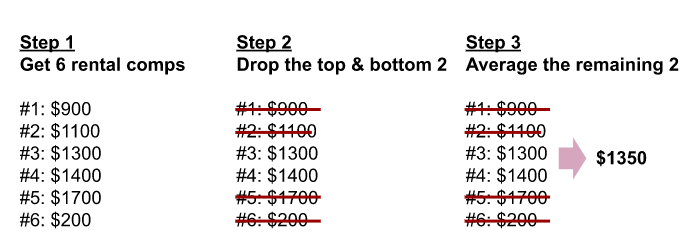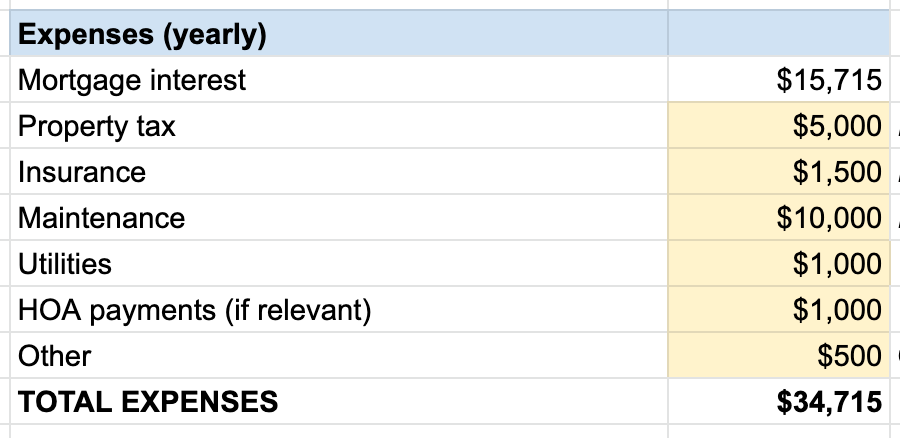You’ve bought a property - a house, or duplex or something bigger. And you want to rent part of it to a friend.
Awkward right? How do you set a price? Friendship & money is like oil & water.
Usually in a friend-to-friend situation you aren’t trying to extract as much rent as you can. You are trying to arrive at something that feels fair and reasonable to both parties.
Here are two methods for how Supernuclear suggest going about this.
Method #1: Market rent method
In this method, you try to figure out what “market rent” is. Your goal is to just charge market rent.
This is of course as much art as science. But here’s a methodology I’d suggest.
Each of you finds 3 properties on the market that you think are comparable. So you have 6 properties total. You review and make sure you both agree that they are reasonable comps.
Next: You drop the 2 most expensive and least expensive. You then average the price of the middle 2.
This method prevents weird outliers from driving the conversation.
The art is of course finding what you think is “comparable.” This is usually a combination of similar location, similar size, and similar level of finish.
These comparables should be current active rentals on the market. Someone’s rent-controlled lease from 5 years ago should not be part of this list.
Method #2: The “Return on Investment” Method
[We created a template to help you implement this method. You can find it here.]
In this method, you are going to calculate a target return on the money you invested in the property. The goal is to make a reasonable, fair return on your cash investment.
Let’s say you bought a $500k house or duplex and put down $100k of cash for the downpayment. You want a friend to move in and pay a fair rent. Your goal is to earn a reasonable return on that $100k cash investment (which otherwise you could put into the stock market, bonds, etc).
What’s reasonable? There’s no clear guidance here. We use 5% at Radish which is a typical return on real estate investment in the Bay Area.
The number should probably be higher than inflation (2.6% over the last 2 decades) and lower than something riskier like the stock market (~8%).
You might justify something on the lower end if your friend is going to make your life easy – staying a long time, helping with repairs, etc. And something on the higher end if they won’t.
Let’s say you choose 5% as your target return. In that case, you want to make 5% x $100k = $5000 in return on your investment every year.
So that means your rent minus your expenses for the year should be $5000.
Here’s what property expenses might look like for a $500k home or duplex. The template has suggestions on how and where to find this information for your property.
This means you will need to cover $35k of expenses plus $5k of investment return with the rent = $40k.
Next you need to divvy up the property into a % that your friend is renting from you. They are not going to cover the full $40k. They are going to cover their portion of it.
If you were in a duplex and both units were equal size and niceness, you would allocate 50% of the rent to your friend ($20k per year or $1667 per month).
If you live in a much nicer unit, you might allocate 1/4 of the rent to your friend ($10k per year or $833 per month).
Something you should also consider doing is adding an adjustment factor for vacancy. If your friend moves out, it might take you some time to re-lease the unit. So you could add another ~5% to their rent to account for expected vacancy in the future. 5% vacancy means the unit would be empty for an average of 2.5 weeks per year (2.5 / 52 weeks ≈ 5%).
What about rent increases?
A good thing to do when renting to friends is have an agreed principle for how and when rent will increase.
Here’s a few ways to think about that
Agree that you’ll increase rent X% every year to keep up with expenses
Agree that you’ll increase rent by inflation every year
Agree that you’ll just pass on the direct cost increases .. e.g. increases in insurance, property tax, etc.
What about capital improvements? Say you decide to invest in a solar power setup that costs you $50k (but reduces energy bills, which your tenant might be responsible for, to zero). Hopefully your friend is reasonable and you can deal with these case-by-case scenarios under the framework above. You can use the template to adjust the rate to reflect additional capital invested (and potential cost reductions).
When it gets hard
Sometimes really bad stuff happens. Maybe a tenant or their family member gets sick and has big medical bills. There may be a perception (true or not!) that you as their landlord are more financially stable and could afford to help them out.
Or on the other side of things, maybe a wildfire hits and your property needs to be evacuated. You and your friend don’t have a place to live, and no one’s happy.
These can be opportunities for friends living together to really shine. We’ve seen friend groups put together solidarity funds for members going through tough situations and offer their spare bedrooms when natural disasters hit.
But it’s not always that easy. In either case, stress can do weird things to friendships. Your perceptions of what’s fair may differ, and there’s often no right answer.
This is why we always recommend having well-defined contracts in place. The post Leases, subleases, and master tenancy, oh my! goes into this in more detail, including a suggested template.
No document is going to be able to anticipate everything that could happen. But it helps to have a baseline for tough conversations that you both agreed to when there weren’t stressful events afoot.
Renting to friends: Fun but sometimes awkward
These tools should clear the way to renting to a friend using a framework that can help everyone agree on what’s fair. It can also help handle future situations where rents need to change … e.g. if more money is invested in the property or if another person joins the mix. Being honest about this and being transparent about why costs are what they are can help you both get to a point where you feel comfortable about the arrangement.
—-
Have you done this a different way? Let us know in the comments
Suggested further reading:









Hey Phil, thanks for writing this! Your article got me thinking, as I’ve lived in situations like this before. I was gonna drop a comment here with thoughts, but then it got too long… so I posted it on my site! Would love your thoughts :) https://kyleschmolze.com/renting-to-your-friends/
- Kyle
public@kyletns.com if you/anyone wants to chat